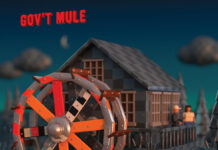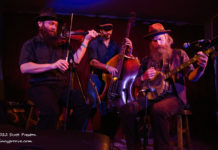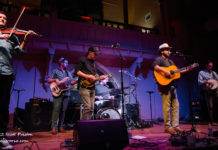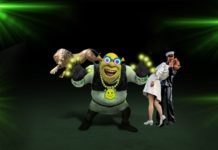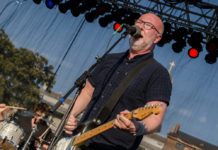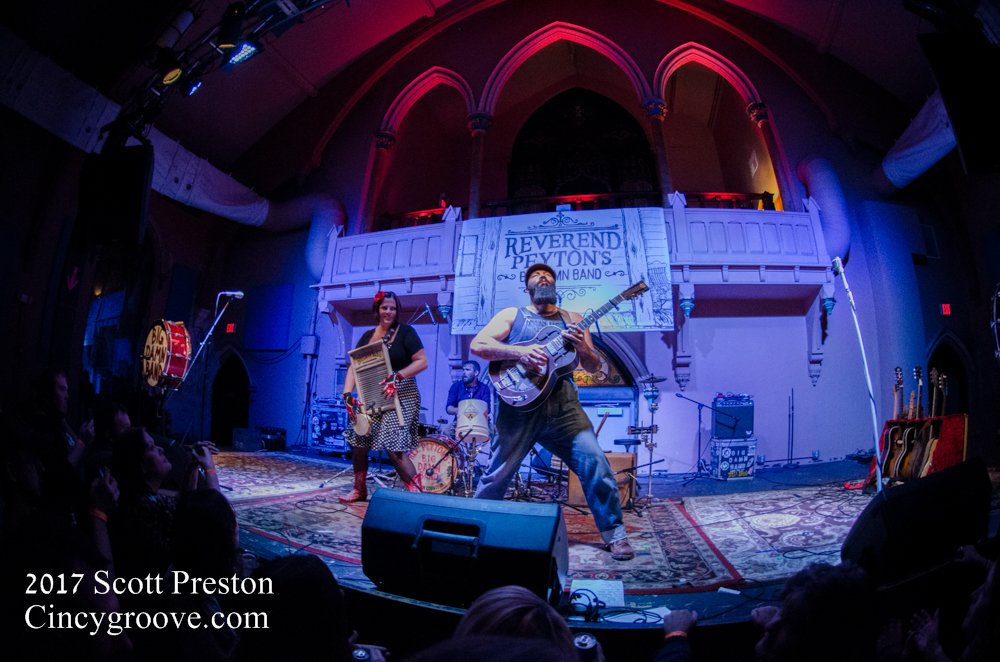It’s easy to hear You Used to Live Here as the kind of record Kelley Mickwee was born to make. After more than a decade of fine-tuning her performance chops, first as half of the Tennessee-based folk duo Jed and Kelley and later as part of the all-girl Texas group the Trishas, Mickwee is releasing an official solo debut that plays like an all-pieces-falling-into-place mission statement of a seasoned artist who’s finally come into her own. But asked about the impetus for the album, she’ll straight-up tell you that it wasn’t so much carpe-diem moxie as it was, well, a kind of panic.
“It’s scary, starting from what’s basically a blank slate, but it was totally out of necessity,” says the singer-songwriter, who in late 2013 found herself facing the question of “what next” when the Trishas decided to take an open-ended break after a five-year run as one of the most promising up-and-coming acts on the Americana music scene. For Mickwee, the prospect of “starting from scratch” as a solo act was initially more terrifying than thrilling. “But I realized I was basically going to be out of a job, so I needed to start getting self sufficient!”
The truth is, Mickwee’s always been more than capable of looking out for herself —and others; they didn’t call her “Finance Trish” in her last band for nothing. Her DIY work ethic (not to mention her marketing degree from the University of Memphis) came in handy throughout her Trishas tenure as well as during the seven years she spent touring and recording as Jed and Kelley. And of course she’s long since proven that she can sing, having taken formal voice lessons since she was 7 years old (after her piano teacher told her mother that, as a piano student, Kelley made a great singer.) After Jed and Kelley broke up and Mickwee moved to Texas, she continued singing onstage with famed songwriter Kevin Welch for a spell, and her sultry Southern drawl seasoned the Trishas’ trademark heavenly harmonies with smoke and earthy grit. She also played guitar and mandolin with the band and found her voice as a songwriter, co-writing seven songs on the Trishas’ 2012 album High, Wide and Handsome.
Given that the Trishas initially came together to play what was supposed to be a one-off gig at a Welch tribute concert, it’s fitting that a song Mickwee later co-wrote with Welch — the gospel/soul infused “River Girl” — would play a key role in shaping her debut solo album. “I was watching that documentary about all of the music that came out of Muscle Shoals, and they kept using this term ‘river people,’ like people who grew up next to a big river,” says Mickwee, who, being a native ofMemphis, naturally took the term to heart. “That gave me the idea to write something that was as close as I could get to Aretha. Of course I’ll never be anywhere near as cool she was, but I started writing it and then finished it with Kevin, because I knew he was the perfect guy to help me write a song like that.”
Mickwee’s desire to get as close to Aretha and the spirit of the song as possible was a big part of what led her back home to Memphis to record the album. Because as much as she’s grown to love her adopted Austin and its own deep pool of musical talent over the last eight years, she knew the sounds she heard in her head could only be brought to life by the Memphis cats she grooved to all through high school and college.
“There’s just something about the way those guys play, and it’s a sound that nobody [in Austin] really sounds like, you know?” she says. “It’s a totally different element, and I don’t know what it is, but it’s just like all these guys grew up playing in countless different bands together, and those Memphis boys just keep it loose! And I wanted it to sound like that. The engineer, Kevin Cubbins— he’s one of the best in Memphis, and he was in a few bands back in the day that I used to go see play all the time. All these guys are people that I’ve known since I sang my first note in public, so I knew I’d be really comfortable around them.”
Mickwee (acoustic guitar and mandolin) and her dream band of mostly Memphis musicians — including her husband, organ and guitar player Tim Regan; pedal steel player Eric Lewis; drummer Paul Taylor; and bassist Mark Edgar Stuart — recorded the album’s seven tracks, all live, over a day and a half in a home studio set up in the living room of a mansion formerly owned by the late Civil War historian Shelby Foote, the author of Shiloh. “The house is old and weird and funky, sort of run down and full of holes, but the studio has all this vintage, antique gear in it,” says Mickwee. “And I mean, it was trippy! The whole experience was really cool.
And so were the songs they recorded there. The organic and soulful Memphis mojo is prevalent throughout, with the record as a whole rooted in Americana and duskier, groovier side of the singer-songwriter genre, but each of the album’s seven tracks showcases a different aspect of Mickwee’s stylistic range. “When you write with someone else, they always bring their own thing to it, so it ends up being different than the others,” says Mickwee. “The song I wrote with Kevin is very different from the one I wrote with Owen Temple [the gorgeous Americana love song “Beautiful Accidents”], and Johnny Burke and I wrote a really raunchy little tune together [“Hotel Jackson,” with the lusty line, “You look like something I want to eat.”]”
The album’s other two originals where co-written with Phoebe Hunt (“Take Me Home”) and Mickwee’s old friend/hero Jimmy Davis (“You Used To Live Here.”) “I credit Jimmy with showing me how to be a performer and sing onstage,” Mickwee says of Davis, who now plays with Walt Wilkins and the Mystiqueros. “I’ve been watching him since I had a fake ID at 16 and started sneaking into bars in Memphis to hear his old band, the Riverbluff Clan.”
Her savvy choice in covers — John Fullbright’s “Blameless” and Eliza Gilkyson’s “Dark Side of Town” — is equally inspiring and revealing. “If I could emulate anyone’s career, it would be Linda Ronstadt, because she’s first and foremost a performer and a singer,” Mickwee explains. “On top of being one of the best singers that we’ve ever known, she was smart enough to realize, ‘Yeah, I can write, but I also have all these friends who are really great songwriters.’ She wasn’t concerned with proving she could write, she just wanted to pick and sing the best songs that she could find. I don’t think we really have any Linda Ronstadts in our type of music (Americana) anymore, and that’s a shame.”
Judging from her stunning interpretations of the Fullbright and Gilkyson songs here, Mickwee may someday prove to be just the artist to fill that void. But for now, it’s more than enough that You Used To Live Here finds her living up to her own full potential. Call it “Mickwee in Memphis.” Or better yet, call it the sound of an artist pushed by necessity into reinventing herself — and coming away with the best music she’s made to date.
Facebook:
http://www.facebook.com/kelleymickwee




